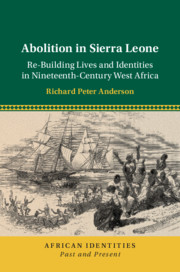Book contents
- Abolition in Sierra Leone
- African Identities: Past and Present
- Abolition in Sierra Leone
- Copyright page
- Dedication
- Contents
- Illustrations
- Acknowledgments
- Notes on the Text
- Abbreviations
- Introduction
- 1 Liberated African Origins and the Nineteenth-Century Slave Trade
- 2 Their Own Middle Passage
- 3 “Particulars of disposal”
- 4 Liberated African Nations
- 5 Kings and Companies
- 6 Religion, Return, and the Making of the Aku
- 7 The Cobolo War
- Conclusion
- Appendices
- Select Bibliography
- Index
1 - Liberated African Origins and the Nineteenth-Century Slave Trade
Published online by Cambridge University Press: 09 January 2020
- Abolition in Sierra Leone
- African Identities: Past and Present
- Abolition in Sierra Leone
- Copyright page
- Dedication
- Contents
- Illustrations
- Acknowledgments
- Notes on the Text
- Abbreviations
- Introduction
- 1 Liberated African Origins and the Nineteenth-Century Slave Trade
- 2 Their Own Middle Passage
- 3 “Particulars of disposal”
- 4 Liberated African Nations
- 5 Kings and Companies
- 6 Religion, Return, and the Making of the Aku
- 7 The Cobolo War
- Conclusion
- Appendices
- Select Bibliography
- Index
Summary
Chapter 1 presents new insights into the geographic origins of Liberated Africans and the dynamics of the nineteenth-century slave trade in West Africa by analyzing and cross-referencing a range of colonial and missionary sources. These combined sources shed new light on the interior origins of slaves in the nineteenth century, especially for the coastlines of the Bight of Benin, Bight of Biafra, and Sierra Leone, which provide the largest amount of data due to the number of recaptives from these regions. Most Liberated Africans came from a limited number of identifiable ethnolinguistic groups, principal among which were speakers of Yoruba, Igbo, Gbe, Hausa, Mende, and Efik. The number of arriving individuals speaking each of these languages likely far exceeded the Settler population of 1807. The chapter argues that perhaps 33,000, or one in three recaptives, spoke dialects of what would soon after be termed the Yoruba language, with the Oyo, Egba, Ijesha, and Ijebu subgroups the most prevalent among them. Igbo recaptives were similarly prominent among those brought on slave ships from the Bight of Biafra, and Igbo speakers constituted perhaps one-fourth of those landed at Freetown.
Keywords
- Type
- Chapter
- Information
- Abolition in Sierra LeoneRe-Building Lives and Identities in Nineteenth-Century West Africa, pp. 30 - 65Publisher: Cambridge University PressPrint publication year: 2020

